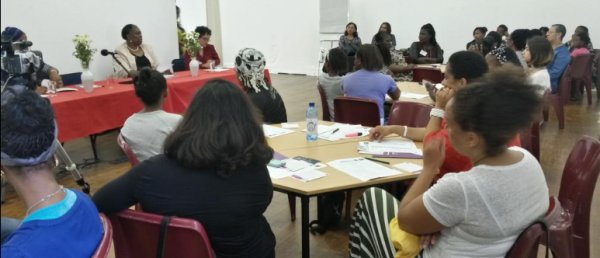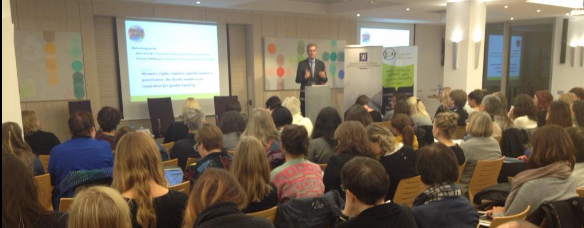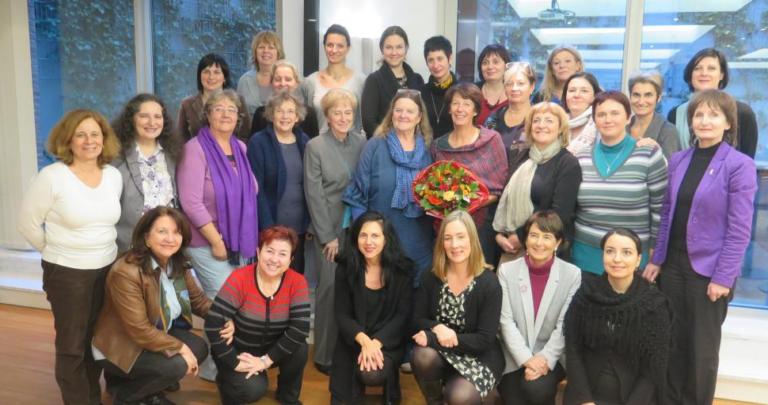[Cape Town, South Africa, 24 November 2014] To celebrate the start of 16 days of activism to end violence against women, South African activists and NGO representatives met in Cape Town to discuss challenges and opportunities to ally and make a change towards a society free from male violence. The event has been proposed by Embrace Dignity, an organisation supporting victims of trafficking and prostitution, and with whom the European Women’s Lobby works.
The South African Constitution, celebrating its 20 years, is very strong on women’s rights and gender equality, thanks to the activism of the women’s national coalition in the 1990s. Despite strong principles, and despite many women in parliament in South Africa, the reality is that there is a lot to do to guarantee all women their full human rights. 1 out of 2 Black young women (between 15 and 35 years of age) is unemployed or doesn’t go to school/university. Data estimate that a woman is killed every 6 hours. The country counts between 100 and 200 000 women in prostitution, the majority of them being Black (in street prostitution) or from Eastern Europe (in escort agencies).
After an inspiring opening by Embrace Dignity’s director Nozizwe Madlala-Routledge, Malika Ndlovu performed moving poems, one of them being a poem which was written as part of the young urban women’s project. Then, more than 40 participants, including many young women and girls from the girls’ movement, shared their vision of a world free from male violence against women. It included taking care of the “last girl” and breaking divisions amongst women to build a strong movement leaving not one single girl or woman behind.
A panel discussion contributed to the reflection by bringing different perspectives:
- Pierrette Pape, from the European Women’s Lobby, highlighted the importance of addressing violence against women as a transversal and universal issue, as part of the global discussion towards a new system (including in the discussions on Beijing+20 and the post-2015 agenda), and not a policy category for politicians to ‘tick’ through short-term action. She shared the current concerns of women’s organisations in Europe, which resonated for the South African activists in the room: conservative and religious attacks on women’s rights, the impact of the consumer society which sends sexualized messages to young girls and commodifies women’s body, the individualistic ideology of neoliberalism which tends to divide civil society and depoliticise women’s liberation. She concluded with positive notes on the development of a new feminism, using social media, and where young women get involved in new ways of campaigning. She called for renewed grassroot action to raise consciousness of women’s rights and liberation, while being more radically calling on decision-makers for accountability.
- Barbara Boswell, from the African Gender Institute, reminded that the gender theory is an instrumental tool to dismantle the patriarchal system and men’s feeling of entitlement over women’s bodies and sexuality.
- Bernette Muthien, director of Engender and Commissioner of the South Africa Commission on Culture, Religious and Language Rights, started with the feminist statement that “the personal is political”, and proposed three concepts which should be at the core of civil society action to achieve a gender equal society: compassion and justice, consciousness, and rematration (what we have in common is that we all come from a woman). She used the perspectives of Ubuntu (“I am because I belong”) to call for a change of values.
Nozizwe Madlala-Routledge closed the event by highlighting the importance of the language used to demand women’s rights and liberation, by giving the example of “prostitution” which has become replaced by the terminology “sex work” which normalize exploitation and support a system of consumerism and abuse. The outcomes of the event, as part of the 16 days on activism to end violence against women, will be used for the work of the Western Cape Network on violence against women, and towards the establishment of a non-partisan and independent women’s movement in South Africa. On 10 December, Embrace Dignity will lead the Dignity Walk, to raise awareness on the plight of women trapped in prostitution, and deliver a petition to the Speaker of the Parliament.
We send all our good vibes to Embrace Dignity and the South African feminists in their new united action!



